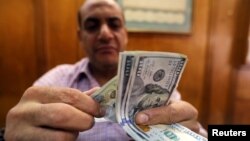Egypt's surprise decision to float its pound currency on Thursday prompted confusion and uncertainty among Egyptians trying to buy or sell dollars and long accustomed to a stable official exchange rate.
Egypt's central bank floated the pound early on Thursday, devaluing it by almost a third against the dollar in an initial move hailed by bankers and the IMF as a big step toward balancing its markets and attracting investment.
“The value of the dollar changed four times since I came to the bank [just now],” said Mohamed Farahat, a 22-year-old student, as he stood in line at Banque Misr, Egypt's second biggest state-owned bank.
“If in just 10 minutes the value changed that much, what is going to happen later?” asked Farahat as he waited his turn to receive a dollar transfer from relatives abroad.
Farahat, who lives in the northern province of Menoufia, came all the way to Cairo to get a $6,000 transfer so that he could avoid waiting for at least a week for the local branch to bring him the money.
“They told me to make a request if I want to receive my money in dollars,” Farahat said.
Black market trading stalls
The Egyptian pound had been pegged at 8.8 to the dollar since March, but a shortage of dollars had put the currency under intense downward pressure. It slid to more than 18 pounds to the dollar on the thriving black market this week, bringing business to a near halt.
The central bank set a temporary guidance on Thursday of 13 pounds to the dollar but by the end of the day it had sold almost $100 million to banks at an average bid price of 14.645.
The lowest bid was 14.3 and the highest 15.6.
Banks in their turn were selling dollars for anywhere between 13.5 and 16 dollars throughout the day. Black market trading came to a standstill as businesses preferred to wait and see where the official rate would stabilize.
Sayed Shabana, a salesman living in Cairo, said he receives a monthly allowance from a relative who lives in Saudi Arabia.
Banks have next move
The wide gap between Egypt's official and unofficial dollar rates had led people like Shabana to insist on receiving their money in foreign currency from the bank and then exchange it on the black market. But Thursday's decision left him stranded.
“No one is going to sell or buy anything now until we see what is going to happen,” Shabana said.
Central Bank Governor Tarek Amer said responsibility for the foreign exchange market now lay in the hands of the banks.
Egypt has struggled to attract dollars since a 2011 uprising that drove away tourists and foreign investors. That has forced the central bank to ration supplies of hard currency and impose strict capital controls, hampering trade in a country that relies on imports of everything from cars to food.





